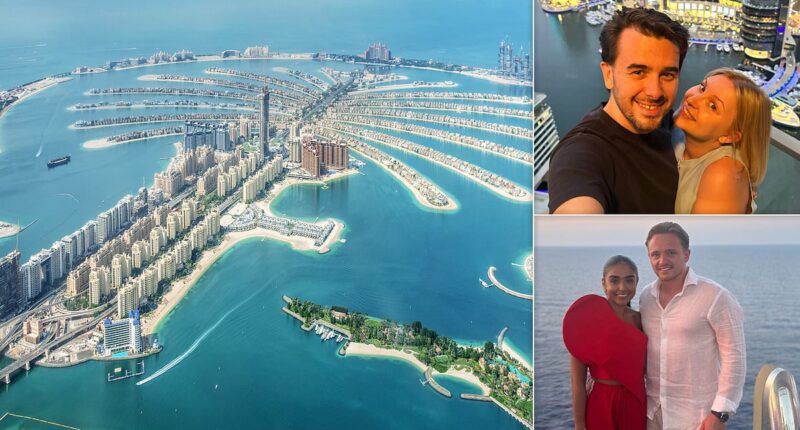Share this @internewscast.com
Dubai is often seen as the land of influencers, oil magnates and supercars.
Last week, former footballer Rio Ferdinand and his wife Kate shared that they had relocated to the emirate with their family. Now, an increasing number of regular Britons are also making the move to escape the UK’s high income taxes and steep housing costs.
They feel Dubai is a city that actually wants them – a world away from Britain with more tax hikes expected in the Autumn Budget.
Expats say their families can enjoy a safer, more affluent lifestyle.
It also doesn’t hurt that residents of the city aren’t charged income tax, meaning workers keep more of their hard-earned cash.
Estimates suggest over 240,000 UK expatriates are residing in Dubai, with numbers soaring by 420 percent from 2019 to 2024, according to data from the relocation company John Mason International.

Expats say their families can enjoy a safer and more affluent lifestyle in Dubai, at a similar or lower cost than they could in Britain
In this article, Money Mail talks to two British individuals living in Dubai to discover what life and work are truly like in this desert city, comparing its costs to those in cities across the UK.
Both individuals are eager to raise their families there and have no immediate plans to return to the UK. Additionally, we gather insights from relocation specialists on the feasibility of making such a move.
Escaping taxes on British business
Joe Makinson, 25, moved to Dubai with his girlfriend, Sophia Mohammed, also 25, in March.
One individual previously worked in recruitment in Manchester. However, he aspired to establish his own firm focused on hiring for the aviation sector, which thrives in the United Arab Emirates (UAE), a key global aviation hub.
‘I wanted to start up my own business and the appeal of doing that in the UK felt quite small,’ he says. ‘The biggest reason for that was tax.’

Joe Makinson moved to Dubai with his girlfriend, Sophia Mohammed, to start a business
Labour has hammered businesses like Joe’s with a swathe of tax hikes in recent years – as well as taking more from the pay of ordinary workers.
Increases in the national minimum wage and employer national insurance contributions have put pressure on small business owners, while stagnant tax thresholds make many employees feel financially squeezed.
Labour has also launched attacks on wealth, increasing the rate of capital gains tax and bringing pensions into inheritance tax from 2027. There are now rumours of stamp duty hikes and a ‘mansion tax’ in the Autumn Budget.
Ed Jennings, 34, runs a law firm that started in London, but is now shifting part of its business to Dubai. The main reason is to escape Labour’s punitive business taxes.
Ed has relocated permanently and is based in his company’s Dubai office which employs around 30 people.
‘A third of our clients are based outside of the UK, and with changes to taxes under the current government we didn’t feel it was a good place to own a business,’ Ed says. ‘With corporation tax, it didn’t make sense to keep putting a third of our revenue through a UK entity any more.’
The main rate of corporation tax jumped from 19 per cent to 25 per cent in April 2023, which applies if a business makes profits of more than £250,000.
In contrast, Dubai has a 9 per cent rate of corporation tax and generous exemptions for businesses turning over less than about £600,000 per year.
Keeping more of your salary
As Britain drives its bright business sparks away, Dubai is keener than ever to snap them up.
Adalberto Pucca, head of sales and business development at relocation expert Global Citizen Solutions, which helps expats move to Dubai, says: ‘We get a lot of exposure to influencers, which can lead people to think they are exclusively the kind of people who relocate to Dubai.
‘But the reality is you don’t need to earn a fortune, and the lifestyle can appeal to many different types of people.’
Pali Banwait, founder and chief executive of relocation company Strive, which advised Joe and Ed on their moves and helped them secure visas, says in his experience the average expat earns about 25,000 UAE dirham a month, which is roughly £5,000.
That’s the equivalent of a £60,000 salary, but equates to about £85,000 before tax in Britain because there is no income tax or national insurance in Dubai.
He says entrepreneurs make up a large proportion of Britons moving to Dubai, as well as software engineers, estate agents and marketing professionals.
There is also a big demand for British-educated teachers to work in Dubai’s many international schools.
‘Most moves are financially driven –you can’t hide from that,’ he says.
Private school for £15,000 a year
The lack of income tax is not the only reason those leaving Britain for Dubai feel wealthier.
Ed shares a stepdaughter Eva, ten, with his partner, Dasha Sakhno, 35, and the family want to send her to a fee-paying school.
‘We can send her to private school in Dubai because the cost here is much cheaper than the UK,’ he says.
‘We will pay £15,000 per year to send her to an outstanding school.’

Savings: Ed Jennings and his partner, Dasha Sakhno want to send 12-year-old Eva to a fee-paying school
Britain’s top independent schools can charge more than double that, with many upping their costs this year after Rachel Reeves announced that independent school fees in Britain would be subject to 20 per cent VAT.
‘When we heard Rachel Reeves would be charging the 20 per cent VAT rates, that made our decision easier,’ Jennings says.
‘The school system in Dubai is phenomenal and there are lots of British schools.’
Ultimately, he just feels richer – and for this reason, he plans to stay in Dubai for the long term.
‘In Dubai, I can keep more of my income and invest in my family’s future,’ he says.
‘Buying a home is significantly cheaper than in the UK, we can put our child in private school, and I can reinvest to secure the future of our business.’
Joe feels the same. ‘We’ll be looking to have a family in the near future, and Dubai is definitely the place we would want to do that,’ he says.
Expats like Ed also feel that the UAE is a safer place to bring up children. Dubai has one of the world’s lowest crime rates, though this is largely due to its harsh justice system, which metes out punishments such as jail sentences and deportation for even minor crimes and still, in rare cases, uses the death penalty.
‘I just felt the UK was no longer for me, on a business or personal level,’ Ed explains.
Is it cheaper to live there?
The city wants to double its population by 2040, and recently started a scheme for first-time property buyers, offering ‘preferential prices’ and cheaper mortgage rates in a bid to attract people priced out of cities such as London.
Whether or not you will find rent and house prices cheap in Dubai depends on where you are from in Britain, with Londoners often feeling they are getting a bargain but Northerners finding it on the pricier side.
You are also out of luck if you want a period property, as virtually everything has been built in the past two decades.
‘Everything depends on where you are buying,’ says Pucca.
‘You can get a two-bed for significantly cheaper in the centre of Dubai than central London.’
Many expats decide to rent before buying – although the scheme for first-time buyers could prompt them to jump on the ladder earlier.
Joe thinks he pays about 20 per cent more to live in Dubai than Manchester, largely because rent is higher – but says it is worth it because he enjoys a better quality of life.
He and his partner rent a two-bed townhouse on the Jumeirah Golf Estate in Dubai’s Jebel Ali district, an exclusive development comprising 1,500 homes and two golf courses.
‘The rent is more expensive than where I lived in the UK, in Manchester. It is 20,000 dirham a month – about £4,000,’ he says.
However Ed, a Londoner, says he finds his cost of living in Dubai slightly cheaper than Britain.
‘I rented a two-bed flat in East London, and now I live in Dubai Marina – the price is actually about £100 less in Dubai,’ he says.
It is also far closer to the centre of the city – and with better views.
He is minutes from the beach and overlooks the recognisable artificial islands of the Palm Jumeirah. Both Joe and Ed are keen to buy property in Dubai in future.
What might they need to pay? ‘It ranges wildly depending on what neighbourhood of Dubai you are in,’ Banwait says.
Along the shoreline, a premium two-bed apartment might cost £700,000. But further inland, it could be as little as £200,000, he adds.
The shoreline is the centre of the action, but the Dubai urban area is relatively small and Banwait says even inland it is ‘only a 15 to 20-minute drive to downtown’.
The city does have a metro, which is cheaper than the tube with the standard fare about 5 dirhams or £1.
However, one of the downsides of Dubai is that it isn’t pedestrian-friendly, so most people still rely on a car to get around. Petrol is cheap, though, at about 50p per litre.
Elsewhere, Britons usually find groceries expensive. It’s not easy to grow vegetables or rear animals in the desert, so almost all food in supermarkets is imported which drives up the cost.
Ed estimates that he spends about £140 per week on food, not including any dinners out. It’s pricey – but he also never has to trek to the supermarket.
‘Everything runs 24-7 here,’ he says. ‘You can get anything delivered to your door within 15 to 20 minutes, no matter the time of day.’
While food is expensive, he says household bills are much cheaper.
In London, his electricity, gas, water, council tax and internet bills set him back about £450 per month – while in Dubai it totals £180.
Relocating to Dubai is not for everyone, and plenty of Britons would be put off by the new-build apartments, ‘always-on’ culture and lack of home comforts – not to mention the weather.
But as the Government keeps hammering ambitious young people with higher taxes – piled on top of high house prices and rents – it’s easy to see why some are having their heads turned.

















